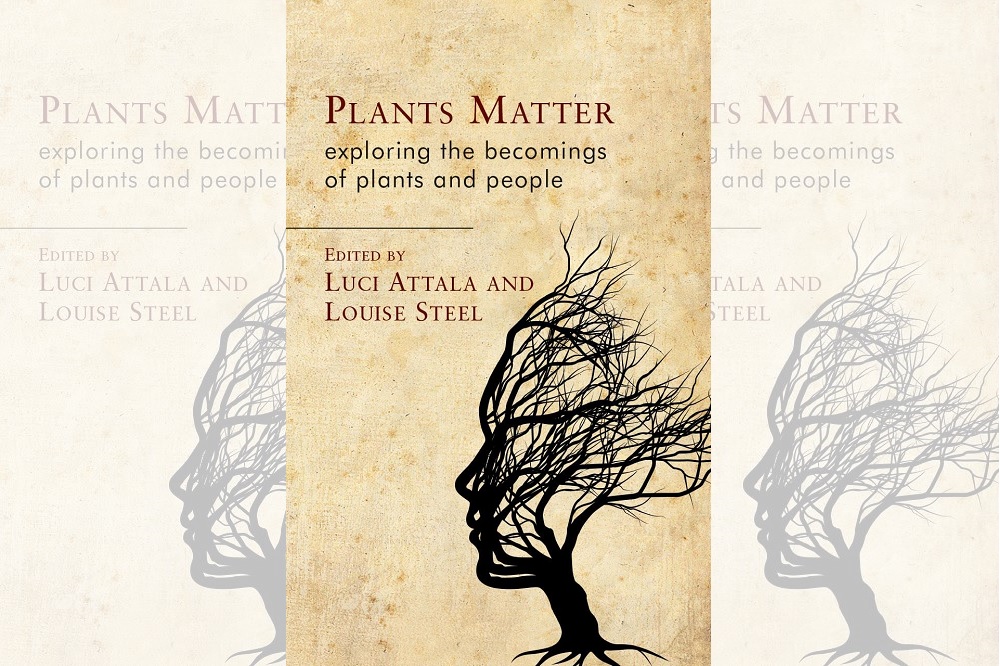Review: Plants Matter, edited by Luci Attala and Louise Steel

Julie Brominicks
I once read Thirteen Ways to Smell a Tree by David Haskell, a bijou, but in no way superficial book. Haskell is a Professor of Biology and Environmental Sciences. His chipper essays explore the science of human senses and tree aromas with clear prose and relevant examples.
The reader for instance, is one minute careening through London streets in a taxi with a cardboard tree on the rear-view mirror wafting pine and lemon scents, the next is effortlessly learning about the chemistry between sunlight, pollutants, and the aromatic molecules of trees.
There are obvious parallels between Haskell’s book and Plants Matter. Plants Matter is also full of interesting details about the evolution of and importance of plants – how they inter-relate with humans (and everything else).
It too, is an anthology whose contributors are academics – in this case from Archaeology and Anthropology. In other ways, the books are different. Though the publisher hopes Plants Matter will also be useful to the general public, it is more textbook than stocking filler and is aimed at universities.
Clever plants
Plants Matter is the third in the series ‘Materialities in Anthropology and Archaeology.’ The ‘New Materialities’ approach, assumes that all things are connected, in a state of flux, and able to have impact elsewhere, on other things. In this case we are shown how plants and people inter-relate. And just how clever plants are.
Guy Waddell reveals how for example, plants can ascertain whether buildings or trees are producing shade. Douglas Firs he says, can lend sugars to beech trees in times of surplus, and receive them back when needed. Marijke Van Der Veen reveals yet more botanical powers; chemical warfare to fight off predators or attract pollinators.
Plants deploy such strategies because they cannot locomote. And by playing on our desires and needs – for sustenance, beauty or intoxication, some have been able to spread across the globe. Domestication she suggests, is something plants have done to us as much as we have to them.
Addictions
Our addiction to some plants like tea and sugar has affected our chemical make-up, physiological and psychological being, and social life. Andrew Russell’s interviews with former tobacco growers in New South Wales, shows that a bond between plant and grower exists as between plant and user.
Tobacco is one of many plants to have exerted its power politically, socially, economically and biologically across the globe.
Tobacco has also been used by indigenous peoples for millennia – and indigenous wisdom runs through the book.
Falk Parra White introduces the Kogi people in Columbia who maintain that just as the planet was first colonised by rock and sand before vegetation, humans first evolved bones (rocks) then veins (to transport blood and oils), which were bound by flesh (soil) on which grows hair (vegetation).
Cutting hair unnecessarily is equivalent to reckless ‘chainsaw behaviour.’ The connection between humans and trees is mutually reciprocal and respectful.
Biodiversity
Sarah E. Edwards explains the relationship between languages and biodiversity hotspots.
‘When a language disappears, so does its embodied cultural wisdom, including medicinal plant loss.’
Among the peoples she introduces us to, are Kate and Illtyd, who, like the others, identify themselves as stewards rather than owners of the land they farm in Cwm Gwendraeth.
Interestingly they learn from naturalised plants as well as native species that plants can heal humans and planet – pointing to the medicinal qualities of evening primrose, and the land-detoxifying properties of Himalayan Balsam.
Edwards tells us about West African healers working with scientists at Kew to transplant medicinal plants. The healers explained to the scientists (who understood the soil to contain important microscopic mycorrhizal fungi) that some soil must also be transferred – because of the ‘spirits’ in it.
‘Both scientists and healers were conveying different interpretations of the same reality.’
[low-mid-content-banner]
Healers
Meanwhile, Julia Laplante and Kañaa discuss how healers refer to vitality and energy flows, as much as to the plants’ healing properties.
Bush doctors involved in the clinical trial for Artemisia afra (African wormwood), renounced the plants in the laboratory. They had no use – having lost their efficacy associated with vitality. Meanwhile the conservation status of 93% of wild harvested medicinal plants is unknown.
This book invites us to consider plants as our equals. The authors maintain that better plant engagement will help us deal with the climate and biodiversity crisis – and halt the loss of necessary traditional ecological knowledge. These important messages demonstrate why academic research should be shared widely.
But Plants Matter is not quite ready for an audience beyond universities. While the chapter ‘Escaping to the Garden and Tasting Life’ by Sarah Page (a straightforward study of home-growing during the pandemic) is cheerfully accessible, most chapters oscillate between simple (sometimes beautiful) and overly complex language, so I went to consult the trees. They said a Welsh Haskell would be useful in spreading the knowledge more widely.
A little later, one pulled up on a tractor. Dylan. He told me about his arthritis. Preferring the benefits of turmeric and pepper, Dylan only turns to pills when desperate. Cattle know how to self-medicate, he says – when short of a certain nutrient (tannin), they eat bark.
“I believe,” he went on, “I really do, that plants have the answers to all our ailments. We just need to tune into them better.” Diolch Dylan.
Plants Matter; Exploring the Becomings of Plants and People, edited by Luci Attala and Louise Steel is published by the University of Wales Press and is available from all good bookshops.
Support our Nation today
For the price of a cup of coffee a month you can help us create an independent, not-for-profit, national news service for the people of Wales, by the people of Wales.






